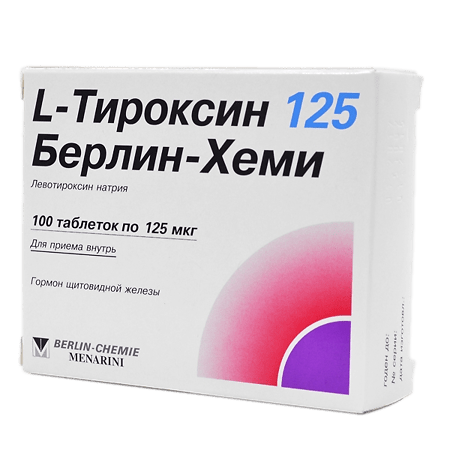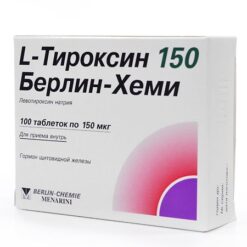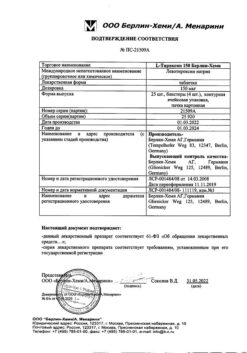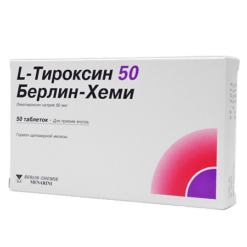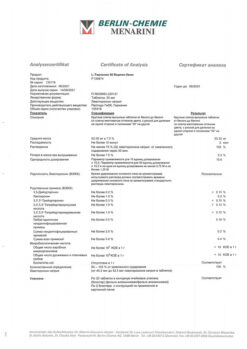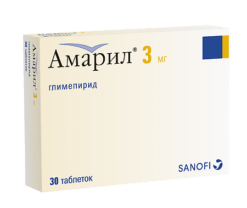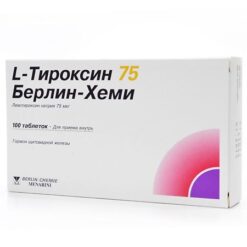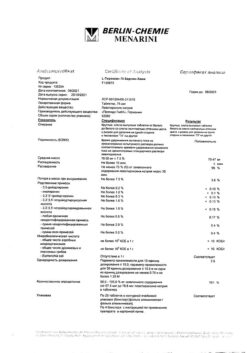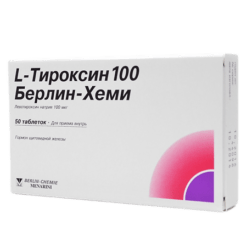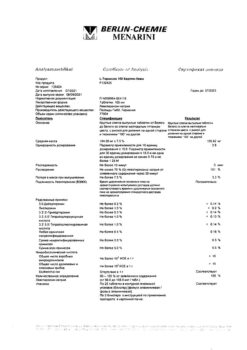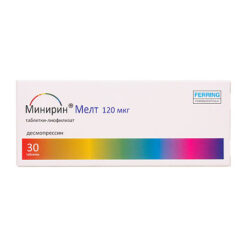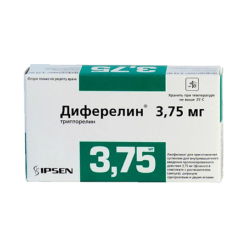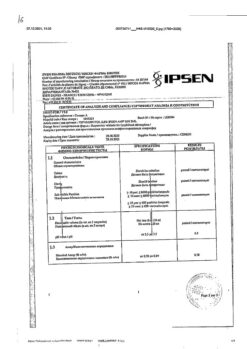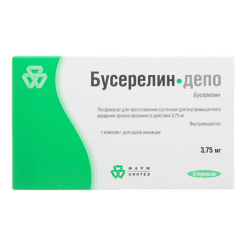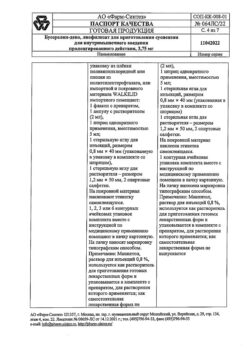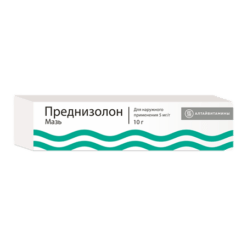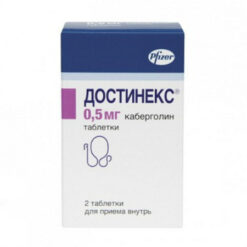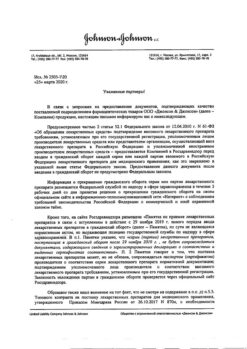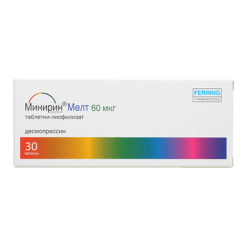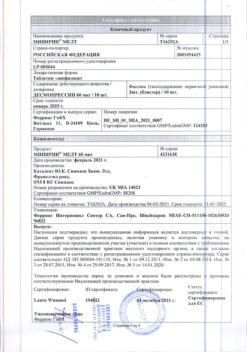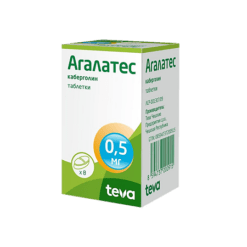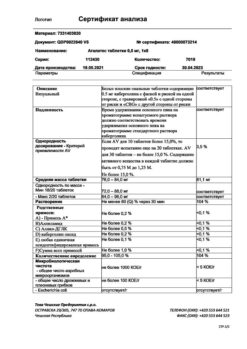No products in the cart.
L-Tyroxine 125 Berlin Chemi, tablets 125 mcg 100 pcs
€5.00 €4.89
Description
A synthetic preparation of thyroid hormone, the left-handed isomer of thyroxine. After partial conversion to triiodothyronine (in liver and kidneys) and transfer to body cells, it influences development and growth of tissues and metabolism.
In low doses it has an anabolic effect on protein and fat metabolism.
In medium doses it stimulates growth and development, increases tissue oxygen demand, stimulates metabolism of proteins, fats and carbohydrates, increases functional activity of the cardiovascular system and the CNS. In high doses it inhibits hypothalamic and pituitary TTH production.
Therapeutic effect is observed after 7-12 days, during the same time the action lasts after discontinuation of the drug. The clinical effect in hypothyroidism is seen in 3-5 days. Diffuse goiter decreases or disappears within 3-6 months.
Indications
Indications
Hypothyroidism of any origin: primary and secondary hypothyroidism, incl. after operations for goiter, as a result of therapy with radioactive iodine or thyreostatics, as a consequence of various thyroiditis.
Prevention of recurrence of nodular goiter after surgical treatment (with normal thyroid function).
Diffuse euthyroid goiter.
Diffuse toxic goiter: after compensation of thyrotoxicosis with thyreostatics (as part of combination therapy).
Thyroid cancer after surgical treatment (to suppress tumor recurrence and as replacement therapy).
As a diagnostic tool when performing a thyroid suppression test.
Pharmacological effect
Pharmacological effect
A synthetic preparation of thyroid hormone, a levorotatory isomer of thyroxine. After partial conversion into triiodothyronine (in the liver and kidneys) and passage into the cells of the body, it affects the development and growth of tissues and metabolism.
In small doses it has an anabolic effect on protein and fat metabolism.
In medium doses, it stimulates growth and development, increases tissue oxygen demand, stimulates the metabolism of proteins, fats and carbohydrates, and increases the functional activity of the cardiovascular system and central nervous system. In high doses, it inhibits the production of TTRH from the hypothalamus and TSH from the pituitary gland.
The therapeutic effect is observed after 7-12 days, during the same time the effect persists after discontinuation of the drug. The clinical effect for hypothyroidism appears after 3-5. Diffuse goiter decreases or disappears within 3-6 months.
Special instructions
Special instructions
In case of hypothyroidism caused by damage to the pituitary gland, it is necessary to find out whether there is simultaneous insufficiency of the adrenal cortex. In this case, replacement therapy with GCS should be started before treatment of hypothyroidism with thyroid hormones is started in order to avoid the development of acute adrenal insufficiency.
Impact on the ability to drive vehicles and operate machinery
The drug does not affect the ability to drive vehicles or work requiring increased concentration.
Active ingredient
Active ingredient
Levothyroxine sodium
Composition
Composition
1 tablet levothyroxine sodium 125 mcg
Excipients:
calcium hydrogen phosphate dihydrate,
microcrystalline cellulose,
sodium carboxymethyl starch (type A),
dextrin,
long-chain partial glycerides.
Pregnancy
Pregnancy
During pregnancy and lactation (breastfeeding), therapy with the drug prescribed for hypothyroidism should continue. During pregnancy, an increase in the dose of the drug is required due to an increase in the level of thyroxine-binding globulin. The amount of thyroid hormone secreted in breast milk during lactation (even when treated with high doses of the drug) is not enough to cause any problems in the child.
The use of the drug in combination with thyreostatic drugs during pregnancy is contraindicated, because Taking levothyroxine may require increasing doses of thyreostatics. Since thyreostatics, unlike levothyroxine, can penetrate the placental barrier, the fetus may develop hypothyroidism.
During breastfeeding, the drug should be taken with caution, strictly in recommended doses under medical supervision.
Use in children
In children, the initial daily dose is 12.5-50 mcg. For a long course of treatment, the dose of the drug is determined from an approximate calculation of 100-150 mcg/m2 of body surface area.
For infants and children under 3 years of age, the daily dose of L-Thyroxine Berlin-Chemie is given in one dose 30 minutes before the first feeding. The tablet is dissolved in water to a thin suspension, which is prepared immediately before taking the drug.
Contraindications
Contraindications
hyperfunction of the thyroid gland of any origin;
untreated adrenal insufficiency;
acute myocardial infarction;
high blood pressure, liver and kidney dysfunction;
increased individual sensitivity to the drug.
Side Effects
Side Effects
Allergic reactions (with hypersensitivity to the drug).
When used correctly under medical supervision, no side effects are observed.
Interaction
Interaction
Levothyroxine enhances the effect of indirect anticoagulants, which may require a reduction in their dose.
The use of tricyclic antidepressants with levothyroxine may result in increased antidepressant effects.
Thyroid hormones may increase the need for insulin and oral hypoglycemic agents. More frequent monitoring of blood glucose levels is recommended during periods of initiation of treatment with levothyroxine, as well as when changing the dose of the drug.
Levothyroxine reduces the effect of cardiac glycosides. With simultaneous use of cholestyramine, colestipol and aluminum hydroxide, they reduce the plasma concentration of levothyroxine by inhibiting its absorption in the intestine.
When used simultaneously with anabolic steroids, asparaginase, tamoxifen, pharmacokinetic interaction is possible at the level of protein binding.
When used simultaneously with phenytoin, salicylates, clofibrate, furosemide in high doses, the content of levothyroxine and T4 unbound to blood plasma proteins increases.
Somatotropin, when used simultaneously with levothyroxine, can accelerate the closure of epiphyseal growth plates.
Taking phenobarbital, carbamazepine and rifampicin may increase the clearance of levothyroxine and require an increase in dose.
Estrogens increase the concentration of the thyroglobulin-bound fraction, which may lead to a decrease in the effectiveness of the drug.
Amiodarone, aminoglutethimide, PAS, ethionamide, antithyroid drugs, beta-blockers, carbamazepine, chloral hydrate, diazepam, levodopa, dopamine, metoclopramide, lovastatin, somatostatin affect the synthesis, secretion, distribution and metabolism of the drug.
Overdose
Overdose
Symptoms characteristic of thyrotoxicosis: palpitations, irregular heart rhythm, heart pain, anxiety, tremors, sleep disturbance, increased sweating, loss of appetite, weight loss, diarrhea.
Treatment: a reduction in the daily dose of the drug, a break in treatment for several days, and the appointment of beta-blockers may be recommended. After side effects disappear, treatment should be started with caution at a lower dose. Antithyroid drugs are not recommended.
Storage conditions
Storage conditions
The drug should be stored out of the reach of children at a temperature not exceeding 25°C.
Shelf life
Shelf life
2 years.
Manufacturer
Manufacturer
Berlin-Chemie AG, Germany
Additional information
| Shelf life | 2 years. |
|---|---|
| Conditions of storage | The drug should be kept out of reach of children at a temperature not exceeding 25 ° C. |
| Manufacturer | Berlin-Chemie AG, Germany |
| Medication form | pills |
| Brand | Berlin-Chemie AG |
Other forms…
Related products
Buy L-Tyroxine 125 Berlin Chemi, tablets 125 mcg 100 pcs with delivery to USA, UK, Europe and over 120 other countries.

